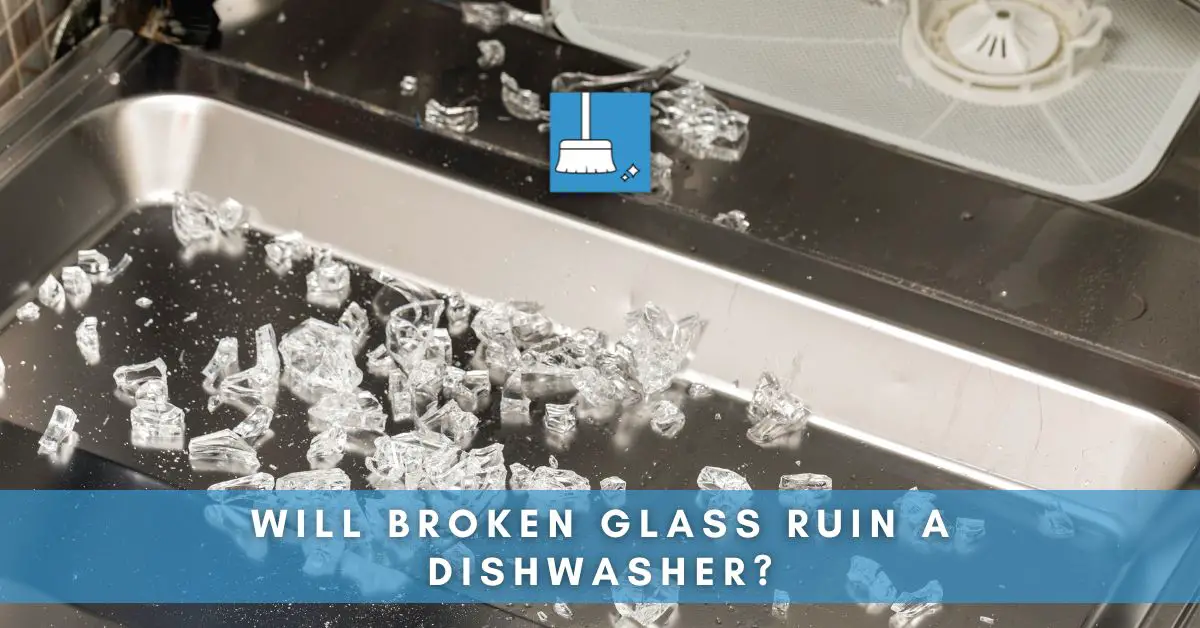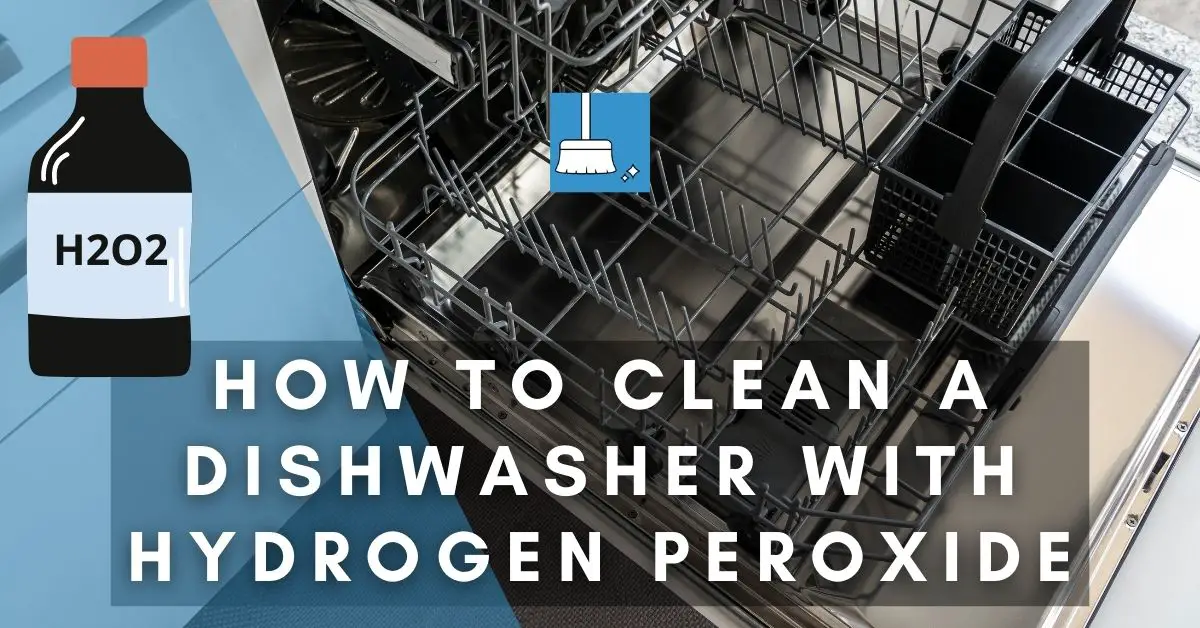So, you’ve loaded your dishwasher and turned it on, and suddenly you hear a loud clanging sound. Immediately you know something broke inside the dishwasher, and you’re dreading cleaning up the shards of glass scattered inside the machine. You’re probably also worried that the broken glass will ruin your dishwasher.
Broken glass can indeed cause damage to your dishwasher if not cleaned out properly. Smaller shards can sneak into smaller gaps and damage delicate parts of your dishwasher. They can also cause issues with the motor and garbage disposal.
In this short article, we will go over the effects of broken glass on your dishwasher and how to clean it up properly. The easiest way to look after your dishwasher is to prevent the glass from breaking, but accidents happen. If a glass breaks in your dishwasher, we are here to help.
Will Broken Glass Ruin a Dishwasher?
Broken glass in your dishwasher doesn’t only damage the components of your dishwasher but can also cause damage to the wash tub, as well as the dishes inside if it keeps running. Most modern dishwashers have a safety installed called the protective drain basket. This is to catch any object that can get into your dishwasher and cause damage.
However, preventing glass breakage and knowing how to clean it properly will prevent any shards from escaping the drain basket. Let’s take a look.
Why Does Glass Break in a Dishwasher?
1- The number one cause of glasses breaking in your dishwasher is overloading the baskets or loading them incorrectly. This can cause the glasses to bump against each other or other dishes and lead to cracks, chips, and breakage.
2- Temperature is also a significant component in glass breakage. Glass expands when exposed to heat and contracts when exposed to cold. If you take a hot glass and rinse it under cold water, it can experience thermal shock from the drastic change in temperature and break.
This can easily happen if you put a cold glass in a dishwasher that uses hot water or if your wash cycle uses hot water and your rinse cycle uses cold water.
Temperature not only affects glass but other crockery as well. Dishwasher causes crazing of dishes.
3- Another cause is blocked nozzles in the wash arm. If something is blocked in your wash arm, it can cause the water to spray unevenly, which can rock your glasses around in the dishwasher. This will cause them to bump against each other and break.
4- The wash arm itself can cause your glasses to break. If you pack glassware on the bottom rack of the dishwasher, there’s a higher chance it can get knocked by the wash arm and break.
5- Finally, you might have some bad-quality glassware. Thin glasses can eventually get brittle after multiple washes in the dishwasher, and they can break very easily then.
What Happens If Glass Breaks In Dishwasher?
So a glass has broken in your dishwasher, and you’re debating just leaving it on and hoping the water will wash away the glass shards. Here is why you should not do that.
When the dishwasher is spinning, water can move the glass shards around and into your other dishes, causing them to crack, chip or break. This will leave you with a mess inside your machine, a bunch of broken dishes, and a possible broken dishwasher.
1- Even though there is a protective drain basket, glass shards can still get past that filter and wreak havoc on your drain pump. A broken drain pump is not only expensive to fix, but it will also cause the other components in your dishwasher to break if you continue using the machine.
2- The drain pipe can become blocked, which in turn causes water to build up in your wash tub as it cannot drain anymore. Water can then start leaking out and cause damage to the external machine, such as the motor and even your cabinets and flooring.
3- Water leakage around electrical outlets also runs the risk of electric shock, and the dishwasher can overheat and break. This means you will have to replace the machine entirely since most warranties do not cover replacement due to human error. So make sure you clean that glass up properly.
How To Prevent Glass From Breaking In Dishwasher
One of the easiest ways to prevent glasses from breaking in the dishwasher is to load the baskets correctly and make sure the glasses are not touching. When you minimize the chance of them bumping against each other, you can reduce the risk of breakage.
Make sure the trays inside are appropriate for glassware. If they are too narrow, they can put pressure on the glasses. In turn, if they are too big, the glasses have more space to move around and hit each other.
When you load your dishwasher, don’t load it too fast. You can accidentally bump a glass against the dishwasher or the basket and break it. Loading the machine slowly decreases the risk of this happening.
Make sure to check the temperature. You can protect your glassware from thermal shock by placing a damp cloth over your glasses. Be sure also to check the modes of your dishwasher, as most of them will have a low-temperature mode specifically for glassware, and then perhaps you can run a separate cycle for your glasses.
Another reason to run a separate cycle for glassware is because of dishwasher detergent. If you use detergent specifically made for glass, it lowers the risk of them becoming brittle over time and breaking.
And then, finally, pack your fragile glassware on the top rack. The more powerful sprayer of the machine is at the bottom, and this way, you protect them against the water.
How To Clean Broken Glass In Dishwasher
Here is a step-by-step on cleaning glass out of your dishwasher and some tips and warnings.
STEP 1- Turn Off The Dishwasher
In case of glass breakage, the number one thing to do is to stop the current cycle and turn off the dishwasher at the outlet.
You might need to give it a few minutes for the arms to stop spinning; then, you can turn it off at the outlet and remove the plug. Be careful of any glass shards that may spray out when you open the door.
STEP 2- Remove The Dishes and Baskets
When you remove the dishes, make sure to inspect them for any cracks, chips, or breaks caused by the main broken item. Be sure to use gloves when you do this. Wipe each item down with a towel to remove any shards of glass that may be on them.
Put the broken glass in a plastic bowl or basket. Then, using a screwdriver, remove the screws holding the baskets in place, take them out of the machine, and wipe them down.
STEP 3- Survey The Damage
Take a look inside the dishwasher and check if the glass has damaged anything in the tub. Be sure to see if any sharp-edged shards can injure you.
STEP 4- Leave The Door Open Overnight To Dry The Inside
A dry tub will make the glass a lot easier to clean, so leave the door open overnight and let the water inside dry out. If you have any pets or small children, turn the dishwasher so the side is to the front and the door can stay open while blocking them from going near the glass inside.
STEP 5- Put On Gloves and Long Sleeves
When cleaning the dishwasher, wear gloves and long sleeves for your safety.
STEP 6- Remove The Spray Arms
The spray arms can get in the way of seeing where all the glass shards are, so make sure to remove them. Wipe the arms down with a kitchen towel to remove any glass shards that may be on them.
STEP 7- Remove The Big Shards of Glass
Carefully use your hands to remove any big shards of glass and put them in the plastic bowl you used for the broken item. Be wary of sharp edges when you pick up the bits.
STEP 8- Use A Vacuum To Remove The Smaller Shards
When you’re left with only tiny shards, a vacuum will be your best friend. Put a stocking over the head of the vacuum to keep any shards from going into the vacuum.
Then, turn it on and run it over the leftover shards in the dishwasher. When the bits collect on the stocking, hover the vacuum over the plastic bowl and turn it off, allowing the shards to drop into the bowl.
STEP 9- Shine A Flashlight Inside To Check For Any More Shards
Sometimes there can still be some micro shards left in the dishwasher. Turn off the light in your kitchen. Then shine a flashlight in the machine to see if any pieces of glass are left.
To remove these micro shards, you can use a wet paper towel to wipe them up carefully.
STEP 10- Remove The Filter and Clean It Properly
Just as a precaution, check the filter to see if there are any glass shards trapped in it. Wipe it down with a towel, then clean it in the sink to ensure there is no glass in the filter. When it’s dry, put it back in.
STEP 11- Put The Baskets Back In The Dishwasher
Put the baskets back into the machine, and then screw them in using the screwdriver. Make sure they are in correctly, and the door can close properly.
STEP 12- Run a Cycle with No Dishes To Remove Any Missed Shards
If there are any glass shards left after this, the chances are pretty good they’re just micro shards. Running a cycle with no dishes will allow the water to wash them away, and it won’t cause any damage to your dishwasher because they’re so small.
Tip: Keep an eye on your dishwasher when you use it after cleaning the glass out. If you hear a clanging noise, immediately stop the cycle, remove the dishes and inspect the filter, drain pump and drain pipe.
Broken Glass In Garbage Disposal
As you know, the dishwasher drain pump pushes the used water from the tub through the drain pipe and releases it into the garbage disposal.
This means if any glass shards get into the drain pipe, they can go into your garbage disposal. Usually, if it’s tiny shards of glass, the garbage disposal will crush them, and they’ll run through.
However, even a tiny piece of glass can block the garbage disposal blades and keep them from running. This can cause food or debris to build up in the garbage disposal.
Luckily it’s easy to clean out glass from your garbage disposal.
STEP 1: Switch Off The Power
Turn the power to the disposal off at the wall, or even the circuit breaker, before you start cleaning the glass out.
STEP 2: Remove Large Pieces of Glass With A Tool
Never put your hands down on the garbage disposal. Instead, use your kitchen tongs or a pair of needle-nose pliers to remove the pieces of glass.
STEP 3: Vacuum The Smaller Pieces
Make sure to use the smallest pipe attachment on a wet/dry vac to clean up the smaller pieces of glass from the bottom of the canister.
STEP 4: Use A Hex Key To Unblock The Blades
If there’s a piece of glass keeping the blades from moving, use a hex key to remove the shard. When you have removed it, use the vacuum again to clean up the last few pieces of glass.
STEP 5: Turn It Back On And Run It
Running it will get rid of any small shards of glass left in the garbage disposal, and you can make sure that it’s running correctly.
Tip: If you still hear a grinding noise, glass is left in the garbage disposal. Perhaps call in a professional to give it a proper clean.
Dishwasher Glass Holders (Far Saving Glass & Your Dishwasher!)
Something that will help your dishwasher experience is a glass holder for your dishwasher. These are specifically designed to keep your glasses safe while in the dishwasher.
A great product to keep your wine glasses safe is the YouU Silicone Stemware Holder, a flexible holder for your wine glasses. We all know wine glasses are usually the first to break, and this holder will make sure your wine glasses don’t move around in the dishwasher.
Tips for Cleaning Glasses
The easiest way to clean your glasses without breaking them entails packing them correctly and working slowly.
1- Wash your glassware separately.
2- Use a detergent made explicitly for glassware.
3- Pack them neatly, with enough space between the glasses, so they don’t bump into each other.
4- Make sure to pack your fragile glasses on the top rack.
5- Check to basket to see if the glasses can move around easily, as that can cause them to bump into each other.
6- Be sure to use a low temperature when you’re washing your glassware.
7- And finally, if you want to keep your glasses as safe as possible, the best way to wash them is by hand.
Final Thoughts!
Even if you put as many measures to prevent the glass from breaking in your dishwasher, accidents happen and ultimately will happen. The best thing is to know how to clean up the glass properly to keep your dishwasher safe and save you a lot of money on repairs.
Still, put preventative measures in place, though, as this will lower the risk of glass breaking in your dishwasher. Happy washing!





